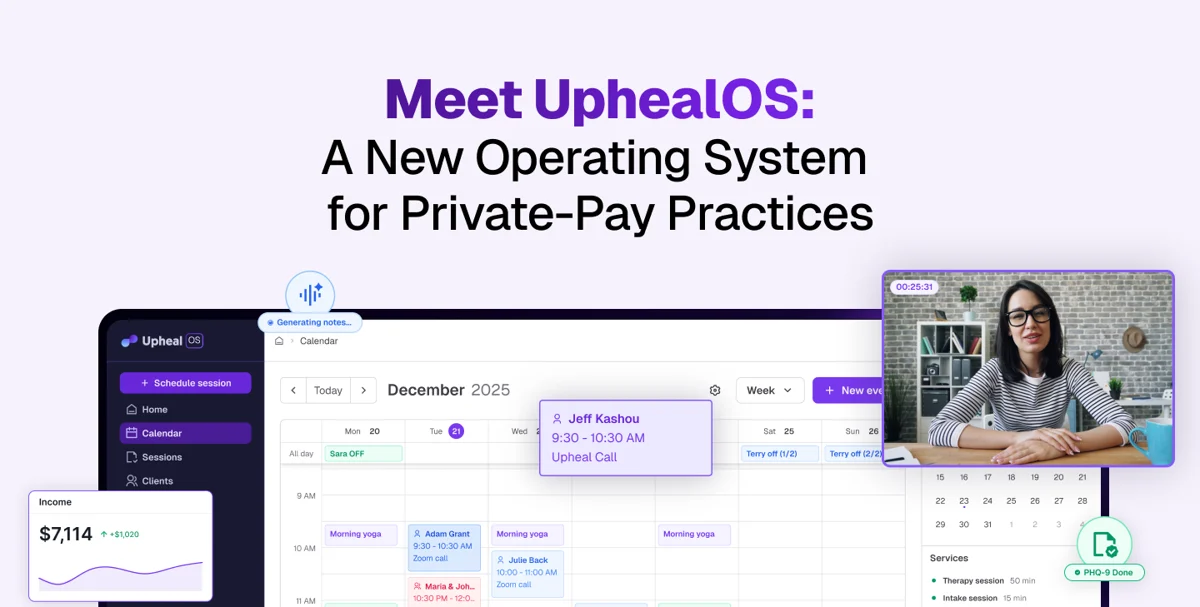Best mental health billing software [2025]
![Best mental health billing software [2025]](https://cdn.prod.website-files.com/6328c07d72b05347cc236c49/68f81f10ab0e3b29dad760f3_Best%20mental%20health%20billing%20software.avif)
Mental health professionals face a harsh reality: up to 15% of potential revenue disappears into billing chaos every year. For a practice generating $150,000 annually, that's potentially $22,500 lost to denied claims, underpayments, and administrative oversights.
Most billing software sells you on seamless claim submission while quietly failing at the hard part: tracking what happens afterward, reconciling payments accurately, and fighting for every dollar owed.
This comprehensive analysis examines the top mental health billing platforms through seven critical criteria that separate revenue-protecting systems from those offering false security.
The seven essential criteria for mental health billing software
Before diving into specific platforms, understanding what actually matters in billing software transforms how you evaluate options. These criteria emerge from billing professionals who've spent years navigating mental health reimbursement complexities.
1. Robust back-office reconciliation and denial management
The battle for revenue happens after claim submission. You need clear aging reports, accessible denial codes, and seamless resubmission tracking.
2. Seamless integration of EHR, billing, and scheduling
Disconnected systems create administrative nightmares. Every manual data transfer introduces errors and wastes time.
3. Human-in-the-loop oversight processes
Full automation sounds efficient but misses subtle payment discrepancies. The best systems balance automation with manual review checkpoints.
4. Behavioral health-specific coding and compliance
Time-based CPT codes, DSM-5 requirements, and ICD-10 behavioral health nuances require specialized platform knowledge.
5. Automated front-end client management
Real-time eligibility verification and automated payment collection protect cash flow before sessions even happen.
6. Scalability and external biller support
Your platform should grow with your practice and seamlessly accommodate professional billing support when needed.
7. Reduction of clinical-to-administrative burden
Software should minimize time on administrative tasks, protecting you from the burnout that drives clinicians from the field.
Platform comparison overview
SimplePractice
SimplePractice has built its reputation on creating an experience that feels contemporary and intuitive rather than clunky and outdated.
Competitive strengths
🔗 Seamless integration excellence
Everything lives in one place with a clean, modern interface. Clinical notes automatically generate billing data without manual intervention.
👥 Best-in-class client portal
Paperless intake, self-scheduling, secure messaging, and automated payment collection create professional client experiences while reducing administrative burden.
📈 Strong scalability design
Group plans include free non-clinician user accounts for billers and supervisors, supporting practice growth without forcing platform changes.
⚡ Automation that actually works
AI-powered tools and intuitive workflows genuinely reduce administrative time rather than just reorganizing it.
Considerations
❌ Scaling becomes expensive as feature needs grow
❌ Key functionality sometimes locked behind higher-tier plans
❌ Telehealth sessions may incur additional per-session costs
❌ CPT code licensing requires separate AMA fee
Pricing structure: Starter at $49/month, Group plans scale from $74/month per clinician for 2-5 users
SimplePractice works best for practices valuing user experience and client-facing professionalism, particularly those expecting growth where seamless biller integration matters.
TherapyNotes
Designed by therapists who understood documentation challenges firsthand, TherapyNotes ties clinical notes directly to billing with remarkable reliability.
Competitive strengths
🔄 Excellent integration foundation
Documentation flows naturally into billing processes. The connection between clinical work and claims submission feels organic rather than forced.
📊 Insurance aging reports that work
Robust financial reporting provides the claim-level detail professional billers need for effective reconciliation.
🎯 Behavioral health coding specialization
Specialized note types for psychotherapy and built-in coding logic reduce denial rates from technical errors.
🛡️ Consistent reliability and support
24/7 support and a stable, well-tested system minimize the frustrating technical issues that plague newer platforms.
Considerations
❌ Limited customization for advanced workflow needs
❌ Multi-location practices face higher pricing
❌ No dedicated mobile app (mobile browser access only)
❌ Per-claim and per-reminder fees add ongoing costs
Pricing structure: Solo starts at $59/month, Group begins at $69/month for first clinician plus $40/month per additional clinician
TherapyNotes serves practices prioritizing documentation quality and straightforward, reliable systems over cutting-edge features or extensive customization.
Ensora Mental Health
TheraNest positions itself as the accessible option for solo practitioners and small practices watching costs carefully.
Competitive strengths
💰 Lowest entry price point
At $29/month for Essentials, it's genuinely affordable for new practices building revenue.
🤖 AI notes enhancement across all tiers
Even basic plans include AI-powered documentation suggestions, reducing note-writing burden.
📊 Reasonable scalability potential
Group practice features and tiered access controls support growth without platform migration.
🔗 Integrated platform approach
Scheduling, notes, and billing live together, eliminating disconnected system frustrations.
Considerations
❌ Critical features like telehealth require paid add-ons
❌ "Free" eligibility checks have usage limits before costs kick in
❌ Final costs become unpredictable with necessary add-ons
❌ Steeper learning curve reported compared to competitors
Pricing structure: Essentials at $29/month, but evaluate total cost after required add-ons
TheraNest appeals to budget-conscious practitioners willing to navigate feature limitations and additional costs in exchange for lower baseline pricing.
Tebra (Kareo)
Tebra brings medical billing sophistication to behavioral health with comprehensive revenue cycle management tools.
Competitive strengths
💪 Superior back-office reconciliation
Real-time claim tracking and denial management tools excel at the critical post-submission work where revenue is won or lost.
📈 Comprehensive RCM integration
Data analytics and performance insights provide professional-grade financial oversight uncommon in therapy-focused platforms.
🎯 Marketing tools integration
Patient portals connect with practice marketing capabilities, supporting practice growth beyond just billing efficiency.
🧠 Behavioral health specialization
Despite medical billing origins, genuine tailoring for mental health coding and workflows.
Considerations
❌ Significantly higher cost than alternatives
❌ Longer learning curve for comprehensive features
❌ May offer more complexity than smaller practices need
❌ Potentially overwhelming for practices wanting simplicity
Pricing structure: Non-physician providers around $150/month, full EHR/PM suite approximately $300/month
Tebra works best for established practices treating billing as strategic business infrastructure rather than necessary overhead, particularly those ready to invest in professional-grade RCM capabilities.
TherapyAppointment
TherapyAppointment embraces straightforward functionality with transparent, volume-based pricing that scales naturally with practice size.
Competitive strengths
💵 Honest, volume-based pricing
Solo pricing ranges from $10-59/month based on client volume, growing costs only as revenue grows.
✅ All features included from baseline
No feature gating across tiers. Access to notes, scheduling, and billing comes standard.
🔔 Unlimited automated reminders at no extra cost
Many platforms charge per reminder. This genuinely reduces costs and no-show rates simultaneously.
🎨 User-friendly interface design
Straightforward design reduces learning curve and ongoing administrative friction.
Considerations
❌ Fewer advanced features than comprehensive platforms
❌ Electronic claim submission may require paid add-on
❌ Integrated telehealth availability varies by plan
❌ Limited sophistication for complex practice needs
Pricing structure: Solo ranges $10-59/month by volume, Group at $59/month plus $39/month per additional clinician
TherapyAppointment serves practices valuing simplicity and cost transparency over feature comprehensiveness, particularly solo practitioners or small groups without complex billing needs.
Finding what works for your practice
Choosing billing software isn't about finding the objectively "best" platform. It's about identifying which trade-offs align with your specific practice priorities.
Prioritize based on your reality:
New solo practitioners with primarily self-pay clients need different capabilities than established group practices managing complex insurance panels. Your current situation and growth trajectory should drive decision-making.
Focus on back-office capabilities first:
Flashy client portals and automated reminders create nice experiences, but robust financial reporting and denial management actually protect revenue. During demos, insist on seeing aging reports, denial workflows, and payment reconciliation processes.
Evaluate total cost honestly:
Starter pricing rarely tells the complete story. Calculate costs including necessary add-ons, per-claim fees, additional user accounts, and premium features you'll actually need.
Consider the biller question:
Even if you're handling billing now, evaluate whether platforms support external biller access. Therapist burnout often stems from administrative burden, and having an exit strategy matters.
Test the billing workflow specifically:
Free trials should focus on end-to-end billing processes, not just clinical features. Submit test claims, apply payments, generate reports. Experience what your actual daily workflow will feel like.
Demand behavioral health specialization:
Generic medical billing platforms miss critical nuances. Your software should understand time-based CPT codes, DSM-5 requirements, and mental health payer idiosyncrasies.
The right billing software works invisibly in the background, surfaces information requiring your attention, and protects every dollar you've rightfully earned through your clinical expertise.
Your practice deserves software that works as hard as you do. Choose accordingly. ✨











![Best teletherapy platforms for therapists [2025]](https://cdn.prod.website-files.com/6328c07d72b05347cc236c49/68bb296e0a57158be728ee91_best%20teletherapy%20platform%20for%20therapists%20thumbnail.avif)
